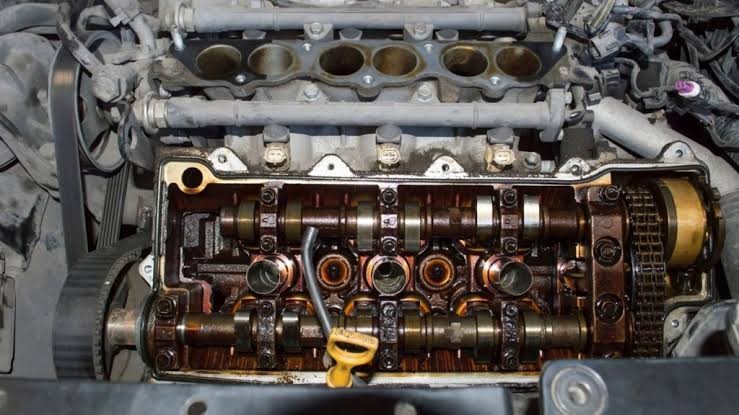Engine oil leaks can be elusive and frustrating to identify. Common areas include valve cover gaskets, oil pans, main seals, filters, cylinder head gaskets, and oil coolers. Consult a professional for accurate diagnosis and repair.
As an experienced automotive technician, I have witnessed numerous challenges in diagnosing and repairing engine oil leaks. These elusive leaks can frustrate even the most skilled professionals, as they often leave minimal traces and are challenging to pinpoint accurately. In this article, we will delve into the world of engine oil leaks, exploring the various areas where leaks commonly occur and equipping you with valuable knowledge to tackle this often perplexing issue.
Valve Cover Gasket:
One of the primary sources of engine oil leaks is the valve cover gasket. Over time, the gasket can deteriorate, leading to oil seepage around the valve cover. The leakage may not be readily visible, but signs like a burning oil smell or oil residue near the valve cover can indicate a compromised gasket.
Oil Pan Gasket:
Located at the bottom of the engine, the oil pan gasket is another potential culprit for leaks. Due to exposure to extreme temperatures, the gasket can shrink or crack, causing oil to seep out. Inspecting for oil accumulation around the oil pan and signs of drips on the ground beneath the engine can help identify a leaking oil pan gasket.
Front and Rear Main Seals:
The front and rear main seals are vital components that prevent oil leakage at the front and rear of the engine's crankshaft. When these seals deteriorate or become damaged, oil can escape, often leaving behind telltale signs of leakage near the engine's flywheel or flexplate. Careful inspection of these areas can aid in identifying oil leaks originating from the main seals.
Oil Filter and Filter Housing:
Sometimes, an improperly installed or faulty oil filter can cause leaks. Additionally, the filter housing, particularly its seal, can degrade over time, leading to oil seepage. Examining the area around the oil filter and checking for oil residue or drips can help identify these issues.
Cylinder Head Gasket:
While commonly associated with coolant leaks, a failing cylinder head gasket can also result in oil leaks. A compromised gasket can allow oil to mix with coolant or escape externally. Checking for milky-colored oil or white smoke from the exhaust, along with signs of oil seepage near the cylinder head, can point to a leaking head gasket.
Oil Cooler:
In vehicles equipped with an oil cooler, a leak can occur in the cooler itself or the connecting lines. These leaks often manifest as oil residue or drips near the oil cooler assembly. Thoroughly inspecting the oil cooler and its surrounding components can reveal the source of the leak.
Frequently Asked Questions:
How can I determine if my vehicle has an engine oil leak?
Look for signs such as oil spots or puddles under the vehicle, a burning oil smell, visible oil residue near engine components, or a decrease in oil levels between oil changes. It's important to consult with a qualified technician to accurately diagnose and address any suspected oil leaks.
Can I continue driving with an engine oil leak?
It is not recommended to drive with an oil leak, as low oil levels can lead to engine damage and reduced lubrication. Addressing the issue promptly is crucial to prevent potential engine failure. If you suspect an oil leak, it is best to have your vehicle inspected by a professional technician.
Are engine oil leaks expensive to repair?
The cost of repairing an engine oil leak can vary depending on the specific cause and the extent of the repair required. In some cases, a simple gasket replacement may suffice, while others may involve more complex repairs. It is advisable to consult with a technician who can provide an accurate assessment and cost estimate based on your vehicle's condition.
Can I use an engine oil leak sealer or additive to fix the issue?
While there are products available in the market that claim to seal engine oil leaks, it is generally not recommended as a long-term solution. These additives may offer temporary relief, but they do not address the underlying cause of the leak. It is best to consult with a professional technician who can accurately diagnose and repair the issue.
How can I prevent engine oil leaks from occurring?
Regular maintenance is key to preventing engine oil leaks. Adhere to the manufacturer's recommended oil change intervals and use high-quality oil and filters. Additionally, have your vehicle inspected regularly by a qualified technician who can identify and address potential leak areas before they become major issues.
Can extreme weather conditions contribute to engine oil leaks?
Extreme temperatures, both hot and cold, can impact the integrity of gaskets and seals, potentially leading to oil leaks. It is important to ensure your vehicle is equipped with the appropriate gaskets and seals designed to withstand the temperature range in your area. Regular inspections and maintenance can help identify and mitigate any issues caused by extreme weather conditions.
Remember, when dealing with engine oil leaks, it is always best to consult with a professional automotive technician who can accurately diagnose the problem and recommend the appropriate course of action. Timely detection and repair of oil leaks can help maintain the health and longevity of your vehicle's engine.

Comments (0)
Please login to join the discussion
Be the first to comment on this article!
Share your thoughts and start the discussion